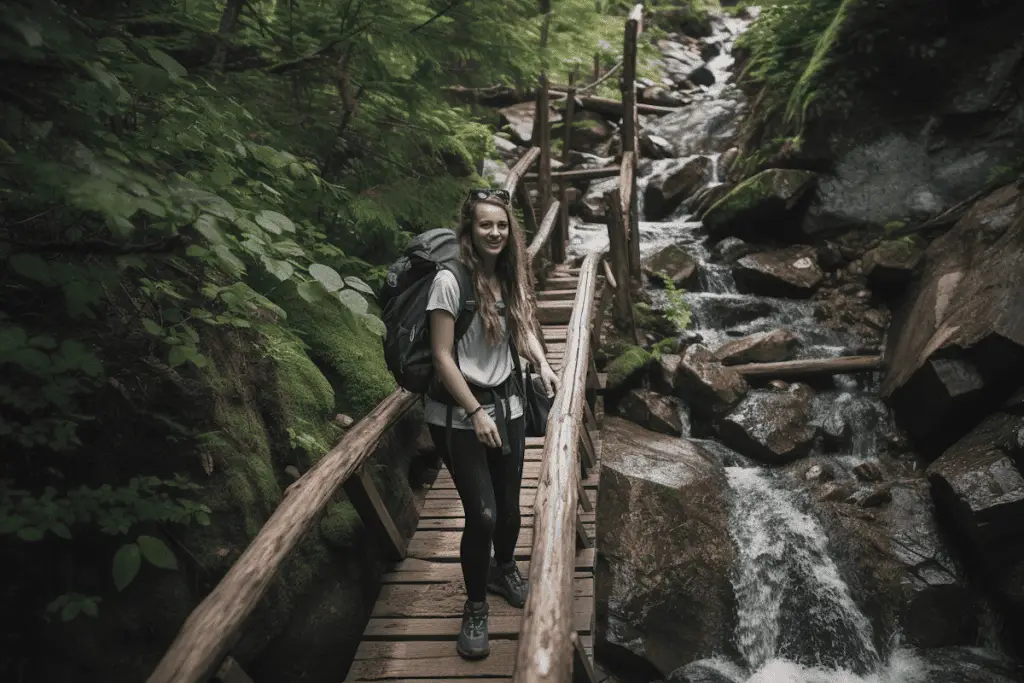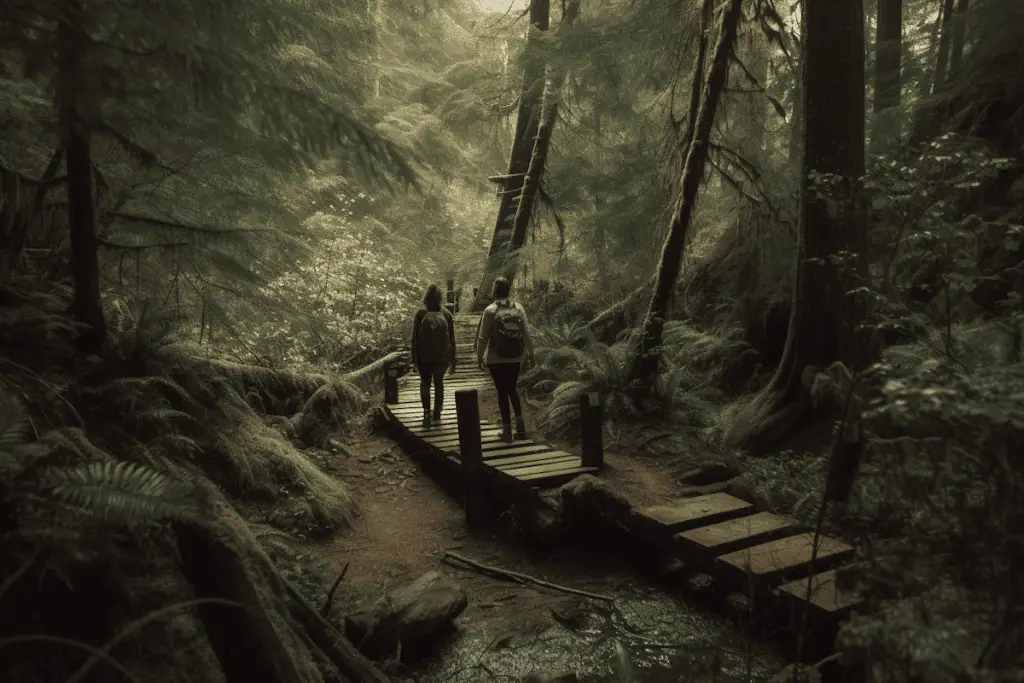When I lived next to a large municipal park, I hiked at least once a day, sometimes twice. It made me feel good and I had a great time, but is it ok to hike every day?
Yes, it is OK to hike every day. Hiking every day is great for your physical, mental, and emotional health.

The Benefits of Daily Hiking: Reaping the Physical Rewards
Who doesn’t love a good, hearty hike? There’s nothing quite like the feeling of lacing up your boots, hitting the trail, and immersing yourself in nature. But did you know that hiking every day can provide you with a host of physical benefits? Let’s dive into some of the health benefits of hiking below.
1. Improved Cardiovascular Health: Daily Hiking as a Heart-Healthy Habit
Have you ever noticed how your heart pounds when you’re trekking uphill or making your way across a difficult stretch of trail? That’s because hiking is a fantastic cardiovascular workout. Consistent, moderately intense exercise helps keep your heart strong and robust. Regular hiking can reduce the risk of heart disease by keeping your blood vessels flexible and free from fatty deposits. What’s more, by lowering your blood pressure, daily hiking helps to alleviate the strain on your heart.
Not only does this benefit your heart in the immediate sense, but it also has profound implications for your long-term health. Regular cardiovascular exercise like hiking has been linked to a lower risk of various health problems, from stroke and type 2 diabetes to certain types of cancer. It’s like a gift that keeps on giving!
2. Enhanced Strength and Endurance: Flexing Your Muscles on the Trail
When you think of strength training, hiking might not be the first thing that comes to mind. However, it’s worth remembering that hiking involves more than just your legs. It’s a whole-body workout that engages your core, your arms, and of course, a whole host of lower-body muscles. This consistent engagement helps to build muscle strength and endurance over time.
What’s more, the great thing about hiking is the natural progression of difficulty. As you hike more, you might find yourself seeking out longer and more challenging trails, gradually increasing your endurance without even realizing it. It’s like nature’s own gym, constantly offering new challenges for you to overcome.
3. Weight Management: Burn Calories in the Great Outdoors
If you’re looking to burn off some extra calories, hiking can be your new best friend. On average, an hour-long hike can burn between 400 to 550 calories, depending on factors such as your weight, the hiking speed, and the difficulty of the trail. This can be a significant help for anyone looking to maintain their current weight or even lose a few pounds.
Remember, though, that weight management isn’t just about burning calories. It’s also about building muscle, which can boost your metabolism and help you burn more calories even when you’re at rest. And as we’ve already covered, hiking is an excellent way to build that muscle!
4. Better Balance and Coordination: Navigating Nature’s Obstacle Course
You’ve probably noticed that not all hiking trails are created equal. Some are smooth and easy, while others are rugged and full of obstacles. But did you know that this uneven terrain can actually be a boon for your balance and coordination? Navigating through these natural “obstacle courses” challenges your body’s proprioceptive capabilities, helping to enhance your sense of balance.
What’s more, the improvements in balance and coordination you gain from hiking can translate to better agility in your daily life. Whether it’s navigating a crowded sidewalk or playing with your kids in the park, the skills you develop on the trail can benefit you off the trail too. It’s yet another reason why daily hiking is more than just a good time – it’s good for you, too.
The Psychological Effects of Daily Hiking
If you’re an avid hiker, you already know that a good hike can leave you feeling invigorated, refreshed, and alive. But did you know that hiking can have profound effects on your psychological well-being, too? Yes, it’s true! Regular hiking can bring a range of mental health benefits, from boosting your mood and creativity to improving your self-esteem and social connections. Whether you’re solo trekking or hitting the trail with a group of friends, hiking can have a meaningful and lasting impact on your psyche. Let’s dive into some of these transformative psychological effects of hiking every day.
1. Boosted Mood and Reduced Stress: Daily Hiking as a Natural Antidepressant
Have you ever noticed that special kind of calm that washes over you when you’re out on a hike, surrounded by nature? That’s no coincidence. Regular hiking can have significant benefits for your mental and emotional health. One major plus is its mood-boosting effect. Being out in nature and getting regular exercise can help your brain produce endorphins, the body’s natural “feel-good” chemicals. This can lead to improved mood and a greater sense of well-being.
Moreover, hiking can also be a powerful stress reliever. It offers a way to escape the hustle and bustle of daily life and immerse yourself in the calming beauty of nature. This mental “time-out” can lower stress levels and even reduce symptoms of anxiety and depression. And this is not a fleeting, one-time benefit – the psychological relief from hiking can last well beyond the trail.
2. Enhanced Concentration and Creativity: The Cognitive Upsides of Hiking
When you’re hiking, you’re not just working your body – you’re also engaging your mind. Navigating trails, observing nature, and overcoming obstacles all require a good deal of focus and thought. This consistent mental engagement can lead to improvements in concentration and cognitive function.
But that’s not all. There’s also evidence to suggest that hiking can boost creativity. It’s believed that the immersive experience of hiking can stimulate new connections in the brain, fostering innovative thinking. So next time you’re on a creative dry spell, a good hike might be just the remedy you need!
3. Improved Self-Esteem and Body Image: The Confidence-Building Benefits of Hiking
Hiking isn’t just about burning calories and building muscle – though those are great benefits too. It’s also about challenging yourself, setting goals, and achieving them. This process can give your self-esteem a significant boost. After all, there’s nothing quite like the sense of accomplishment you feel when you reach the top of a difficult trail.
In addition, as you get fitter and stronger from hiking, you may find that your body image improves too. It’s not about losing weight or looking a certain way, but rather about appreciating what your body can do. It’s about seeing strength in every step, resilience in every mile, and beauty in every challenge overcome.
4. Improved Social Connections: Hiking as a Bonding Experience
Hiking doesn’t have to be a solitary experience. In fact, it can be a great social activity, whether you’re with family, friends, or part of a hiking club. This shared experience can foster a sense of camaraderie and help strengthen social bonds.
Sharing the experience of hiking can also create opportunities for teamwork, mutual support, and shared memories. Not to mention, it provides a chance to disconnect from digital distractions and engage in meaningful face-to-face interaction. So next time you hit the trail, consider bringing along a hiking buddy. The connections you make might just be as rewarding as the hike itself!
On the Trail Every Day? Here’s How to Decide If Daily Hiking is Your Perfect Fit
Wondering if you should pack your hiking boots and hit the trail every single day? Well, it’s a decision that depends on several factors. Let’s dive into them, shall we?
First off, consider your current fitness level. Hiking, particularly on rough terrains, can be physically demanding. If you’re already in good shape, you might find daily hiking to be a fantastic way to maintain or even improve your fitness. But if you’re a beginner, it might be wise to start off slow. Begin with shorter, easier hikes and gradually build up your stamina and strength. Remember, every great hiker started with a single step!
Next up, think about your schedule. Do you have enough free time to devote to daily hikes? Hiking isn’t just about the time you spend on the trail, it also includes the time spent preparing, traveling to and from your hiking spot, and of course, recovering afterward. So, ensure your schedule can accommodate it.

Let’s not forget about your interest and passion, too. Daily hiking could be a great fit if you love nature, enjoy solitude or outdoor socializing, and find joy in physical activity. But if the thought of spending hours outdoors isn’t appealing, or if you prefer more variety in your exercise routine, daily hiking might not be for you.
Lastly, your location matters. Do you have accessible hiking trails nearby? If you’re lucky enough to live close to nature, daily hiking can be a breeze. But if the closest trail is hours away, it might pose a challenge.
So, is daily hiking right for you? That’s a question only you can answer. Consider your fitness level, your schedule, your passions, and your environment. If the shoe – or should I say, the hiking boot – fits, lace it up and hit the trail!
Hitting Pause: The Essential Role of Rest and Recovery in Hiking
So, you’re all set to lace up your boots and venture on daily hikes? That’s fantastic! But before you set off, there’s an essential element of any fitness routine you need to keep in mind: rest and recovery. Yep, it’s as crucial to your hiking journey as a good pair of boots or a sturdy backpack.
Think of rest and recovery as your body’s time to repair and rejuvenate. When you hike, your muscles are working hard, and this work can create tiny micro-tears in your muscle tissue. Now, don’t worry, these aren’t harmful. In fact, they’re part of the process that makes you stronger! But your body needs time to repair these micro-tears and build your muscles back up stronger than before.
In addition to physical recovery, rest days are also great for mental rejuvenation. We’ve talked about the psychological benefits of hiking, but it’s also important to remember that your brain needs a break, too. Taking a rest day allows you to switch gears, reflect on your hikes, and return to the trails with renewed enthusiasm and focus.
Don’t think of rest days as ‘non-hiking’ days, rather, think of them as a part of your hiking journey – a different kind of trail, if you will. During these days, you could engage in light activities, known as active recovery, like yoga or stretching exercises. You could also use this time to take care of your hiking gear, plan your next trail, or just kick back and relish the memories of your past hikes.
So, as you embark on your hiking adventure, remember: rest is not a detour; it’s an essential part of the journey. Don’t hesitate to hit the pause button now and then. Your body and mind will thank you!
Common Misconceptions About Daily Hiking
When it comes to daily hiking, there’s a forest of myths and misconceptions out there. It’s high time we cleared some of these up, don’t you think? Let’s tackle a few of the most common misconceptions about daily hiking head-on.
1. Myth: Hiking every day is bad for your knees
Reality: Hiking, like any physical activity, can cause knee discomfort if you’re not doing it right or if you’re not adequately prepared. But with the correct technique, appropriate gear, and gradual conditioning, hiking can actually help strengthen your knees. If you listen to your body, maintain a steady pace, and use supportive gear like hiking poles, daily hiking can be perfectly fine for your knees.
2. Myth: You have to be super fit to hike every day
Reality: Not at all! One of the best things about hiking is its accessibility. People of all fitness levels can enjoy hiking. If you’re new to hiking or working on your fitness, you can start with shorter, easier trails and gradually increase the difficulty and duration as your fitness improves. Daily hiking doesn’t mean you’re climbing Everest every day!
3. Myth: Daily hiking means you need to spend a fortune on gear
Reality: While it’s true that some hiking gear can be pricey, you don’t need to break the bank to start hiking. The most important piece of equipment is a good pair of hiking boots, which can be found in a range of prices. As for other gear like backpacks, trekking poles, or moisture-wicking clothing, you can accumulate them over time and as per your needs.
4. Myth: Hiking is a solitary activity
Reality: Hiking can indeed be a wonderful opportunity for solitude if that’s what you’re after. However, it can also be a fun, social activity. Hiking with a group or a friend not only adds an element of safety, but it can also be a great way to build stronger connections.
So there you have it. Daily hiking is adaptable, accessible, and most importantly, enjoyable. Don’t let misconceptions stand in the way of your hiking adventures!
Tips for Incorporating Daily Hiking into Your Routine
Thinking of stepping up your fitness game with some daily hiking? That’s a great decision! But now, the question is, how do you weave this new adventure into your daily routine? Don’t worry, we’ve got you covered. Here are some practical tips for integrating daily hiking into your lifestyle.
1. Start Small and Gradually Increase
If you’re new to hiking, or even if you’re an experienced hiker but new to daily hikes, don’t bite off more than you can chew. Begin with shorter, less challenging hikes and gradually increase your distance and difficulty over time. This strategy can help prevent burnout and injuries, and it’ll allow your body to adjust to the new routine.
2. Plan Your Hikes
If you’re hiking daily, some organization will help you a lot. Consider creating a weekly or monthly hiking plan. Include factors like the trails you intend to take, the difficulty level, estimated duration, and weather conditions. A plan will not only keep you on track but also ensure you have variety in your hiking adventures.
3. Make the Most of Your Local Area
Don’t have a mountain range in your backyard? No problem! Look for local parks, nature reserves, or even urban trails in your city. You might be surprised at the number of hiking options available around you once you start looking!
4. Equip Yourself
Invest in a comfortable pair of hiking boots and a sturdy backpack – your daily companions on the trail. Over time, you might want to add items like trekking poles, a hydration pack, and moisture-wicking clothing to your hiking gear. But remember, you don’t need to buy everything at once.
5. Listen to Your Body
The most crucial tip is to always listen to your body. If you’re feeling fatigued or if something hurts, take a rest day. Hiking is meant to be enjoyable and beneficial to your health, not detrimental.
Integrating daily hiking into your routine is a journey, not a race. Take it one step at a time, savor the process, and before you know it, you’ll be a regular on the trails!
Summing It All Up
In conclusion, hiking every day can be a beneficial, enjoyable, and truly enriching experience. From improving your physical and mental health to boosting your social connections, the advantages are wide-ranging and significant. However, whether daily hiking is suitable for you ultimately depends on your individual circumstances, including your physical fitness, schedule, interests, and location. Be sure to consider these aspects carefully before embarking on your daily hiking journey.
Also, remember that rest and recovery are crucial elements of any fitness routine, including hiking. Don’t neglect them! Finally, beware of common misconceptions about daily hiking, and don’t let them hold you back. If you’re ready to take on the challenge, integrate hiking into your daily routine with practical strategies and enjoy the journey. After all, the joy of hiking is as much about the journey as it is about reaching the destination.
